only pressured the Russian elite financially, but it has not guaranteed that the assets will be returned to Ukraine. The REPO Act allows the U.S. government to seize Russian oligarchs’ assets and redirect them to support Ukraine. However, this action has not completely won the battle for Russian assets, as the legal and financial complications of asset seizures can be complex.
The decision made by the European Commission to use the revenue from frozen Russian assets to provide Ukraine with financial support for its defense needs is significant. This move demonstrates the EU’s commitment to standing in solidarity with Ukraine and providing practical assistance in the face of Russian aggression. By allocating a substantial amount of funds annually to Ukraine, the EU is contributing to the country’s defense efforts and helping to strengthen its capabilities in the ongoing conflict. The bi-annual payments starting from July 2024 will ensure that Ukraine receives the necessary support on a regular basis.
The frozen Russian assets serve as a source of revenue that can be utilized to bolster Ukraine’s defense industry and military capabilities. By redirecting a portion of these funds to purchase weapons for Ukraine, the EU is helping to address Kyiv’s urgent security needs. The decision to review the distribution of funds on an annual basis ensures accountability and transparency in the utilization of the resources. This approach enables the EU to adapt its support to Ukraine based on the evolving situation on the ground and the country’s defense requirements.
While the U.S. has taken a more aggressive stance by proposing the outright seizure of Russian assets through the REPO Act, the EU has opted for a different approach by leveraging the windfall profits from frozen assets to support Ukraine. This strategy aims to avoid potential legal and fiscal complications associated with asset confiscation while still providing substantial assistance to Ukraine. The EU’s decision to provide financial support to Ukraine through the revenue of frozen Russian assets underscores the importance of international solidarity in the face of Russian aggression and the ongoing conflict in Ukraine.
Overall, the allocation of funds from frozen Russian assets to support Ukraine’s defense needs represents a significant step in the international community’s efforts to stand by Ukraine in its struggle against Russian aggression. By providing substantial financial assistance on a regular basis, the EU and other Western partners are demonstrating their commitment to supporting Ukraine’s sovereignty and security. The decision to prioritize Ukraine’s military requirements in the distribution of funds highlights the importance of strengthening Kyiv’s defenses and capabilities in the face of continued threats from Russia. The ongoing support from the EU and other allies will be crucial in helping Ukraine defend itself and maintain stability in the region.














